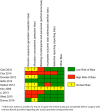Preoperative exercise therapy for gastrointestinal cancer patients: a systematic review
- PMID: 30041694
- PMCID: PMC6058356
- DOI: 10.1186/s13643-018-0771-0
Preoperative exercise therapy for gastrointestinal cancer patients: a systematic review
Abstract
Background: Gastrointestinal cancer patients are susceptible to significant postoperative morbidity. The aim of this systematic review was to examine the effects of preoperative exercise therapy (PET) on patients undergoing surgery for GI malignancies.
Methods: In accordance with PRISMA statement, all prospective clinical trials of PET for patients diagnosed with GI cancer were identified by searching MEDLINE, Embase, Cochrane Library, ProQuest, PROSPERO, and DARE (March 8, 2017). The characteristics and outcomes of each study were extracted and reviewed. Risk of bias was evaluated using the Cochrane risk of bias tool by two independent reviewers.
Results: Nine studies (534 total patients) were included in the systematic review. All interventions involved aerobic training but varied in terms of frequency, duration, and intensity. PET was effective in reducing heart rate, as well as increasing oxygen consumption and peak power output. The postoperative course was also improved, as PET was associated with more rapid recovery to baseline functional capacity after surgery.
Conclusions: PET for surgical patients with gastrointestinal malignancies may improve physical fitness and aid in postoperative recovery.
Keywords: Cancer; Exercise therapy; Preoperative; Surgery.
Conflict of interest statement
Ethics approval and consent to participate
This study was deemed exempt from IRB approval by the Wake Forest Baptist Health IRB.
Consent for publication
Not applicable for this systemic review.
Competing interests
The authors declare that they have no competing interests.
Publisher’s Note
Springer Nature remains neutral with regard to jurisdictional claims in published maps and institutional affiliations.
Figures
References
-
- Sur MD, Namm JP, Hemmerich JA, et al. Radiographic sarcopenia and self-reported exhaustion independently predict NSQIP serious complications after pancreaticoduodenectomy in older adults. Ann Surg Oncol. 2015:3897–904. 10.1245/s10434-015-4763-1 - PubMed
Publication types
MeSH terms
LinkOut - more resources
Full Text Sources
Other Literature Sources




